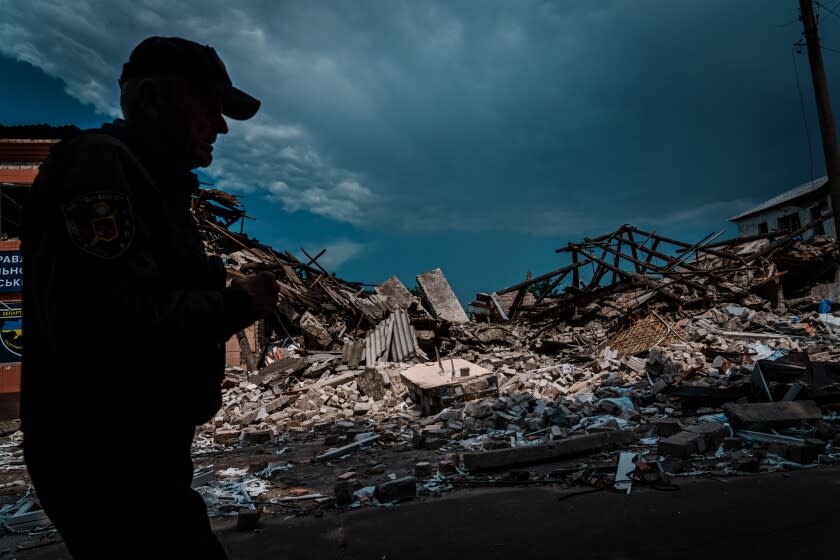Op-Ed: Ukraine suffers, but Putin, and Russia, will be the loser

- Oops!Something went wrong.Please try again later.
- Oops!Something went wrong.Please try again later.
Russia can’t win its war against Ukraine for a simple reason. It’s not just fighting Ukraine. It’s fighting against much of the world. The European Union granted Ukraine candidate status on Thursday, and more than 50 countries are now part of the so-called Ramstein group — committed to supporting Ukraine, including all 30 NATO members.
Russia’s only declared ally is Belarus, but the degree and reliability of its support, and the extent of its willingness to get embroiled in the actual fighting, are at best uncertain.
The Belarusian population, which actively demonstrated against the country’s dictator, Alexander Lukashenko, in 2020 and 2021, is overwhelmingly opposed to getting involved in the war. The Belarusian army’s morale and ability to fight effectively are also questionable. Indeed, the collapse of the Lukashenko regime is not inconceivable should Belarus invade its neighbor only to be repelled.
China, with which Russia signed a friendship pact in February 2022, has supported Russia verbally while preferring to stay out of the war and pursuing economic relations with the West.
Kazakhstan, which Russian President Vladimir Putin may have expected to be supportive after Moscow’s intervention in the January 2022 riots that rocked that country, has also proven to be unreliable.
Kazakh elites appear determined to boost their military capabilities, while Kazakh President Kassym-Jomart Tokayev recently stated that his country does not, and will not, recognize Ukraine’s pro-Russian breakaway republics, Luhansk and Donetsk. To add insult to injury, Tokayev made the statement publicly, while sitting on a stage across from Putin.
Moldova, fearful of a Russian incursion into its own breakaway entity of Transnistria, has also turned against Moscow. On June 19, the Moldovan president signed into law legislation banning the transmission of Russian television propaganda. Its parliament also engaged in an unprecedented event — a joint session with the parliament of Romania, at which both bodies expressed their support of Ukraine and condemned Russia’s aggression.
In a word, Russia is alone, facing an armada of politically, militarily and economically powerful states. Were Russia a modern superpower, it might be able to resist for a very long time. But Putin’s Russia is a third-world country with the bomb. Russia’s GDP pre-sanctions was smaller than that of Texas. Once the sanctions, along with the outmigration of Russian millionaires and professionals, do their worst, Russia’s GDP will be even smaller and its economic woes and difficulties funding the war greater.
The Russian army, once vaunted as the second best in the world, has shown itself to be mediocre. The billions that went into its supposed modernization appear to have been purloined; its approach to warfare remains mired in the mid-20th century; its tanks are old, and its missiles are running out.
The Russians have incurred huge losses in the Donbas as they've closed in on Ukrainian resistance in the symbolically significant Luhansk and Donetsk provinces. Аt the same time, Ukraine’s armed forces are preparing a counteroffensive in the strategically important Kherson province, where they could recapture the canal that supplies water to Crimea and nullify Russia’s hopes of a land corridor there.
Worse (for Moscow), once Western — and especially U.S. — deliveries of heavy armaments pick up this summer, the Ukrainian military believes that it will be able to turn the tide and drive the Russians out of the territories they occupied since the war began.
Russia, of course, possesses a vast arsenal of strategic and tactical nuclear weapons. There is little reason to think that Putin, in his desperation, would not at some point use them, but there is also no reason to think it would afford him an automatic victory. Ukrainians have faced the choice of fighting or dying since the war broke out, and they’re unlikely to opt for surrender if Putin resorts to the bomb. The Ukrainian people would suffer greatly in a nuclear attack, but the anti-Russian coalition’s response to it would only hasten Russia’s ultimate defeat.
Putin probably never expected that his war against Ukraine would turn the world against Russia. Many Western countries may have been just as surprised at their own international unity. Sober Russians, meanwhile, have realized that their army’s assault has not only failed to defeat the Ukrainians but has also created a powerful anti-Russian coalition that Russia has little chance of countering.
Hence the Kremlin’s perennial interest in negotiations: There is no end game for Russia that does not leave it weakened, and a strengthened Ukrainian counteroffensive will only erode Moscow’s bargaining power.
The choice before Ukraine’s allies is simple: Minimize the carnage by doing all that is possible to force Russia’s withdrawal quickly or defeat the Russians slowly and maximize the bloodshed. Either way, Putin, and Russia, will be the loser.
Alexander J. Motyl, a specialist on Ukraine, Russia and the U.S.S.R., is a professor of political science at Rutgers University.
This story originally appeared in Los Angeles Times.

